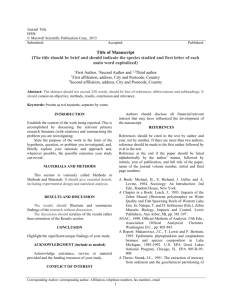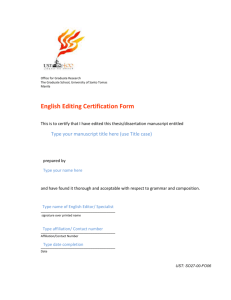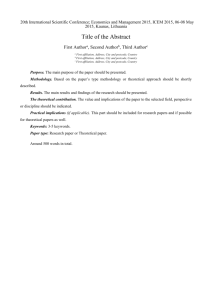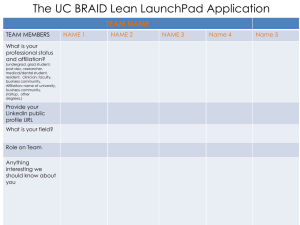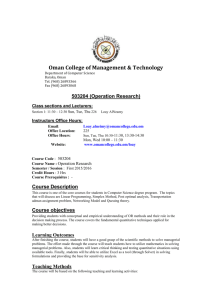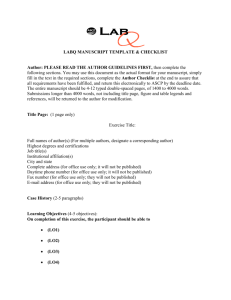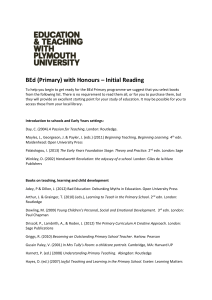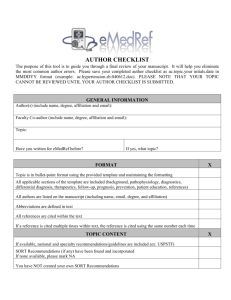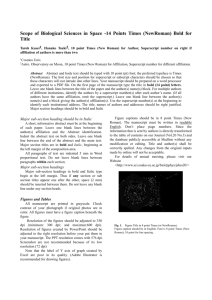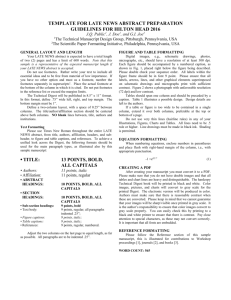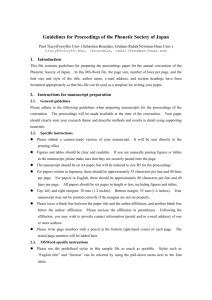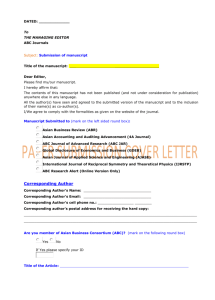NSP Format - Noble Science Publishers
advertisement
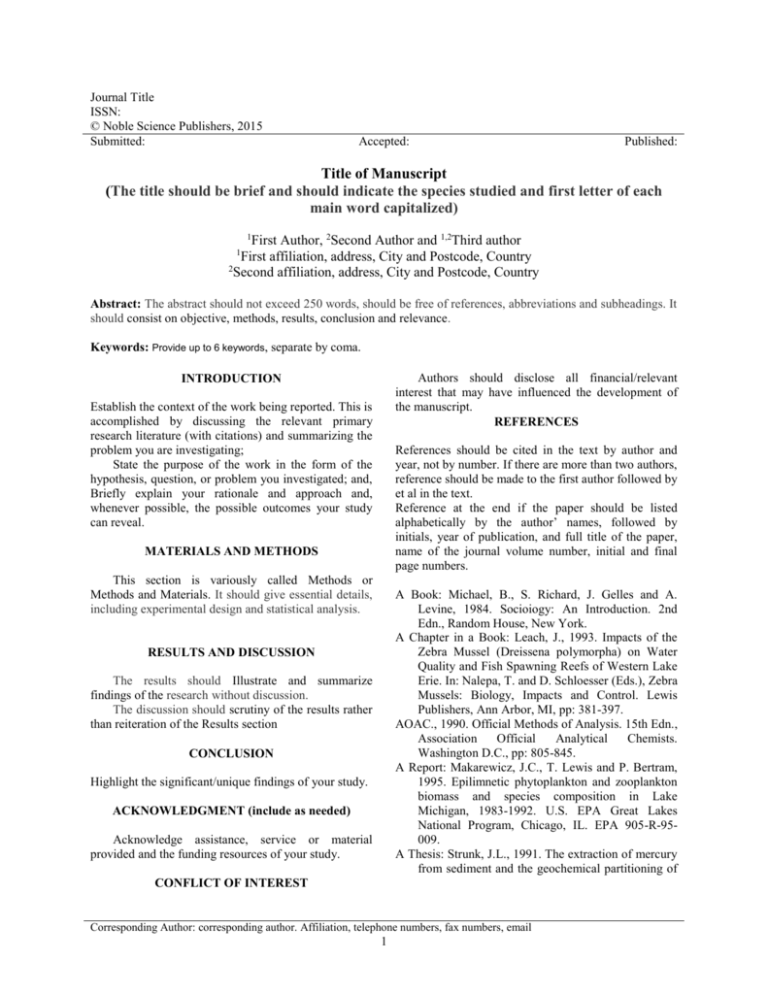
Journal Title ISSN: © Noble Science Publishers, 2015 Submitted: Accepted: Published: Title of Manuscript (The title should be brief and should indicate the species studied and first letter of each main word capitalized) 1 First Author, 2Second Author and 1,2Third author First affiliation, address, City and Postcode, Country 2 Second affiliation, address, City and Postcode, Country 1 Abstract: The abstract should not exceed 250 words, should be free of references, abbreviations and subheadings. It should consist on objective, methods, results, conclusion and relevance. Keywords: Provide up to 6 keywords, separate by coma. Authors should disclose all financial/relevant interest that may have influenced the development of the manuscript. REFERENCES INTRODUCTION Establish the context of the work being reported. This is accomplished by discussing the relevant primary research literature (with citations) and summarizing the problem you are investigating; State the purpose of the work in the form of the hypothesis, question, or problem you investigated; and, Briefly explain your rationale and approach and, whenever possible, the possible outcomes your study can reveal. References should be cited in the text by author and year, not by number. If there are more than two authors, reference should be made to the first author followed by et al in the text. Reference at the end if the paper should be listed alphabetically by the author’ names, followed by initials, year of publication, and full title of the paper, name of the journal volume number, initial and final page numbers. MATERIALS AND METHODS This section is variously called Methods or Methods and Materials. It should give essential details, including experimental design and statistical analysis. A Book: Michael, B., S. Richard, J. Gelles and A. Levine, 1984. Socioiogy: An Introduction. 2nd Edn., Random House, New York. A Chapter in a Book: Leach, J., 1993. Impacts of the Zebra Mussel (Dreissena polymorpha) on Water Quality and Fish Spawning Reefs of Western Lake Erie. In: Nalepa, T. and D. Schloesser (Eds.), Zebra Mussels: Biology, Impacts and Control. Lewis Publishers, Ann Arbor, MI, pp: 381-397. AOAC., 1990. Official Methods of Analysis. 15th Edn., Association Official Analytical Chemists. Washington D.C., pp: 805-845. A Report: Makarewicz, J.C., T. Lewis and P. Bertram, 1995. Epilimnetic phytoplankton and zooplankton biomass and species composition in Lake Michigan, 1983-1992. U.S. EPA Great Lakes National Program, Chicago, IL. EPA 905-R-95009. A Thesis: Strunk, J.L., 1991. The extraction of mercury from sediment and the geochemical partitioning of RESULTS AND DISCUSSION The results should Illustrate and summarize findings of the research without discussion. The discussion should scrutiny of the results rather than reiteration of the Results section CONCLUSION Highlight the significant/unique findings of your study. ACKNOWLEDGMENT (include as needed) Acknowledge assistance, service or material provided and the funding resources of your study. CONFLICT OF INTEREST Corresponding Author: corresponding author. Affiliation, telephone numbers, fax numbers, email 1 J-Title mercury in sediments from Lake Superior. M.S. Thesis, Michigan State Univ., East Lansing, MI. Conference/Proceedings: Muhammad, B.F. and R. Kwali, 2005. Prospects and constraints to small scale yoghurt production in Bauchi Metropolis. Proceeding of the 10th Annual Conference of the Animal Science Association of Nigeria. University of Ado-Ekiti, Sep. 12-15, pp: 234-236. Journal Articles: Ouyang, D., J. Bartholic and J. Selegean, 2005. Assessing sediment loading from agricultural croplands in the Great Lakes Basin. J. Am. Sci., 1(2): 14-21. NRC., 1989. Nutrient Requirements of Dairy Cattle. 6th Rev. Edn. Natl. Acad. Press, Washington, D.C., pp: 90-110. Provide all tables in Tabulated format not in image. Tables should use horizontal lines only, with only blank space to separate columns Figure Captions: Please note the following points: Provide self-explanatory caption (s) of Figures Put Figure No. In ascending order as well as in text Provide good quality of Figures Figures insert within column have at most 3 inches width and without column have at most 5.5 inches width (Please modified figures of manuscript according to the format (all charts, graphs and diagrams in Black and Gray color with white background without graph lines)) All Figures should have Font style: Time New Roman and Font Size: 10 with sharp writing Maps should be saved in a neutral data format such as JPEG, TIFF or EPS. Scanned figures (in JPEG and TIFF formats) should have a resolution of 300 dpi (halftone) or 600 to 1200 dpi (line drawings) in relation to the reproduction size. To insert images in Word, position the cursor at the insertion point and either use Insert | Picture | From File or copy the image to the Windows clipboard and then Edit | Paste Special | Picture (with “Float over text” unchecked). TABLES and FIGURES Large and complex tables, figures and maps should be avoided in the main paper, but can be included in a data appendix for use by the reviewers. Notes under each table and figure should be used to explain and specify the source of all data shown. Tables Captions: Please note the following points: Provide self-explanatory caption of Table Put table No. In ascending order as well as in text 2
